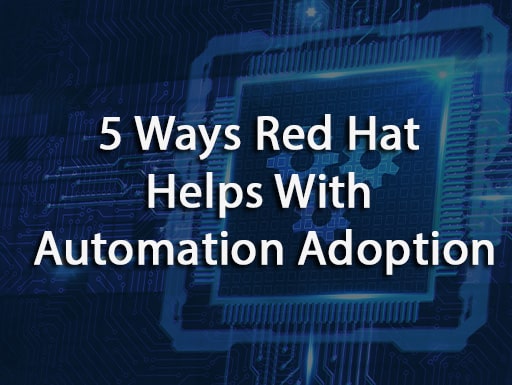5 Ways Red Hat Helps With Automation Adoption
November 8, 2022

Forbes identified automation as one of its Top 10 Digital Transformation Trends for 2023. Companies are embracing automation to replace time-consuming and error-prone manual configuration processes, promote standardization and reliability, and overcome IT staff shortages.
To be successful with automation, organizations must identify the right opportunities for IT automation and create a strategy that involves automating many processes across the organization. Companies should take an incremental approach to their automation journey with the help of a consultant and the right tools to achieve enterprise-wide automation for IT and business processes.
A Red Hat consultant can help your company create a strategy for automation that includes the Red Hat Ansible automation platform, meets your business goals, and targets the appropriate use cases so you can develop a full automation program.
Here’s an overview of 5 ways Red Hat helps your business adopt automation:
1) Navigation
The process of adopting automation is a journey that requires navigation to be successful. Using navigation to develop an overall automation strategy will help your company avoid pitfalls along the way.
A Red Hat consultant can take your company through a navigation process that involves identifying goals with measurable outcomes and uncovering any processes that can be replaced with automation. Skills gaps and potential problems can be pointed out and addressed.
2) Laying a Foundation
The Red Hat Ansible automation platform provides a framework for the next step in the adoption process. Your company can use Red Hat Ansible to automate your initial workflows and deploy them into production. Forbes called out Ansible as one of the no-code or low-code automation solutions that will be a focus of the trend toward digital transformation.
Ansible allows your organization to implement automation across the business. With Ansible, automations can operate at scale all the way to the cloud and the edge of the network.
3) Integration
Next, a set of standardized and automated workflows needs to be integrated with existing operational and business support systems. Integrating automations allows for oversight and orchestration of automated workflows.
With successful integration through the Red Hat Ansible framework, automations should be capable of orchestrating security systems; managing the network across physical, software-defined, and cloud-based networks; and deploying and upgrading applications.
4) Acceleration
The process of automation adoption doesn’t stop with integration. The goal is to accelerate the development of an entire automation program. Once your company has successfully implemented a use case for automation, you can use this as a springboard for moving forward to identify and execute more automation across the enterprise.
Your automation consultant can guide your in-house automation teams in standardizing and implementing automation approaches across the business. Ansible makes it easy to accelerate the adoption of automation, such as those for network management, by providing pre-packaged collections, roles, and modules.
5) Optimization
Ongoing optimization should be part of automation adoption. Automation teams should combine and improve upon workflows and orchestrations while continuing to develop and launch automation.
With the help of Red Hat experts, your company can take an agile approach to automation by carrying out continuous improvement of automation. This process of continuous improvement and growth will allow your organization to adapt automation to meet changing needs of the business.
Finding an Automation Consultant
When adopting automation, your company should look for a technology partner that can guide you through the entire process, from identifying opportunities to executing and optimizing them. To be successful with automation, your business needs to establish a framework that encourages standardization, scalability, orchestration, and process transformation.
ProActive Solutions has expertise in Red Hat solutions, including Ansible. We can use our consultative approach to help your organization identify opportunities for automation that lessen the burden of manual infrastructure, security, and network management. Our Red Hat experts can start you on the road to end-to-end automation.
Find out how Red Hat can help your company along its automation adoption journey. Request a consultation with a ProActive Red Hat expert.
